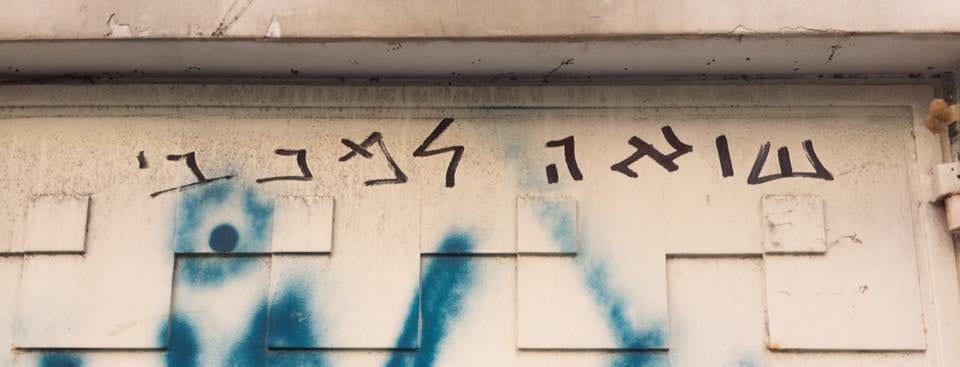The poet Hayim Nahman Bialik is reported to have said that the nascent state of Israel would take its place amongst the nations of the world when the first Hebrew thief and the first Hebrew prostitute would be arrested by the first Hebrew police man. Updated for 2018, perhaps Israel joins the ranks of the nations of the world when Hebrew football fans make Hebrew wildly inappropriate Holocaust references in Hebrew graffiti.

I saw the above graffito, which reads “Holocaust Against Maccabi,” this past June when I was in Tel Aviv doing research at the Bialik house-museum. Now just a few months later I’m at the end of my own wildly inappropriate Holocaust reference also coming from a Jewish and Hebrew source. It’s part of an accusation that’s nonsensical on the face of it
There’s a guy with an M.A. from my graduate department and a Google Groups newsletter. He seems to think he’s a bit of a macher in the Brooklyn Sefardi/Mizrahi community. Or something. And he is known for being quite convinced that he is the keeper of the One True and Correct Interpretation of Sefardi Culture. His most recent newsletter addressed the well-documented problem of the primacy of Ashkenazi (Eastern European) culture in the Jewish world at the expense of attention and value given to Sefardi and Mizrahi (Spanish and Near Eastern) cultures. (For scholarly takes on this, see the work of my NYU colleague Ella Shohat, among others.) However, he addresses the problem by accusing Jewish Studies departments in U.S. universities of making themselves “Sefardirein,” or free of Sefardim, invoking Nazi-era terminology in which places that had been completely cleansed of Jewish “contaminants” were referred to as “Judenrein.”
And I am a part of the problem:

First and foremost it strikes me as wildly inappropriate and utterly lacking in any sense of proportion to describe the hiring and curriculum decisions of any academic department, let alone Jewish Studies departments, in terms of mass murder and genocide especially in a political climate that presents real neo-Nazi threats to American Jewry.
Second, the attitude reflected in this presentation of the problem is a bit short-sighted and helps to reinforce academic structures that don’t serve medieval or Jewish topics especially well. Modern disciplinary boundaries are bad for the study of the Middle Ages, which is a period when there was far greater interplay between literature, philosophy, religion, and history than there is in the modern conception of those modes of thinking and writing, and when the role of religion in culture and society was drastically different than it is in the modern world. As such, separating fields of study according to modern standards often makes it difficult to deal with medieval texts and other forms of cultural production holistically and on their own terms. The same applies to modern countries. Particularly with regard to the study of literature in modern university departments, the work is typically divided along national-linguistic lines. Late nineteenth and early twentieth-century quests for national origins in the various and relatively new countries of Europe led to the confinement of literary traditions and cultural programs to within the boundaries of the modern nation state when in fact they were far more expansive, fluid and mobile. Ultimately, the Middle Ages became a tool for the nationalisms of Spain, France, and Germany, amongst others. This meant that the contributions of religious, linguistic, and cultural minority populations were often ignored and even suppressed in the interest of curating a particular image of the nation and its history; this trend naturally found its place in the Americas, too, and it is only very recently that it has been possible to talk about things like Jewish and Muslim, Hebrew and Arabic contributions to Spanish literature. In terms of securing the place of the Sefardim in Europe in particular and establishing a true panorama of medieval literature in general, it is far more unusual and important that my appointment be in a Department of Spanish than in one of Jewish Studies. It’s all so obvious to me that I kind of can’t believe I have to keep saying all of this, but it’s equally obvious that the outside world has not yet gotten the message.
And finally: Sure. I’m not in Judaic Studies at NYU, at least partly because I’m not convinced of the utility of Jewish Studies as a framework.* That said, I’ve served on half a dozen doctoral committees and a search committee in that department. And within in a period of five years before I’m even a decade out of graduate school, I will have held both major US-based Jewish Studies research fellowships. So whatever my own ambivalence about Jewish Studies as a field and about disciplinary/field boundaries in general, and regardless of my not being appointed in that program at my home university, it’s not like I’m not participating in Jewish Studies conversations and making a name for myself there.
The takeaway: Am definitely a part of the Jewish Studies establishment even if that’s not where my NYU appointment lies. Disciplinary boundaries don’t help Sefardi Studies anyway. And this is definitely not a genocide; don’t ever lump me in with Nazis just because you think my intellectual life isn’t Jewish enough.*
(*Each of these sentences could be the start of a blog post in its own right. Perhaps for another moment.)
